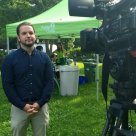Oct. 1 is voting day in Quebec, and young people hold more power than ever to decide the winner.

For the first time, one-third of the electorate will be between 18 and 39 years old.
“This number is the same as the baby boomers,” said Pierre Reid, Quebec’s chief electoral officer.
This week, politically minded youth have been coming together at Bishop’s University in Lennoxville for the second annual Bishop’s Forum.
“I would describe it as a boot camp for civic engagement for young, English-speaking anglophones,” said Bishop’s Forum 2018 director Russell Copeman.
In the past, guest speakers have included former premier Jean Charest.
Young English speakers are invited from all over the province to learn how to be active citizens.
READ MORE: Who will Anglo Quebecers vote for?
“They discuss themes such as social change, citizen engagement, political involvement,” Copeman explained.

Get daily National news
But will Quebec’s young people put all their power to good use? Last election, only about half of them voted.
“People from our generation kind of get scared off when you mentioned the word politics,” said forum participant Megan Le Stum.
With the election campaign beginning Aug. 23, the major parties will be bending over backwards to court voters. What is the one topic that will bring young people out to the ballot box?
“I’m going to be looking for more immigrants and refugees coming to Canada,” said Jessica Vanier, who studies culture at McGill.
“Do you guys want immigrants or do you not want immigrants, which one is it?” said Sophia Ba, a Montrealer originally from West Africa.
“On immigration and integration, what are these political parties presenting to me?” said Christina-Nancy Eyangos.
READ MORE: CAQ could form minority government, but still lacks anglophone support
Other topics of concern among forum participants included education, the environment and LGBTQ rights.
“I care a lot about LGBT rights and equal rights for all gender identities,” said Frédérique Larouche of Sainte-Julie.
Nigel Adams traveled 14 hours from an Indigenous community near the northern tip of Quebec to take part in the conference.
“I’ll vote for whoever has the best opinions regarding the north and Indigenous people,” he told Global News.
“There’s the classic: Is there going to be another referendum? Does one party look like they’re going to do another referendum?” said Chris Kalafatidis, who grew up in east-end Montreal.
Of the nine English speakers who spoke to Global News, Kalafatidis was the only one who called separation a priority.
“I want to look at everything else they offer. A party is not limited to that topic,” said Le Stum.
“I don’t think it will affect my vote,” said Bishop’s student Guillaume Levesque.
Will the youth vote beat its 50 per cent turnout rate from the last election? It depends if politicians tell them what they want to hear.






Comments